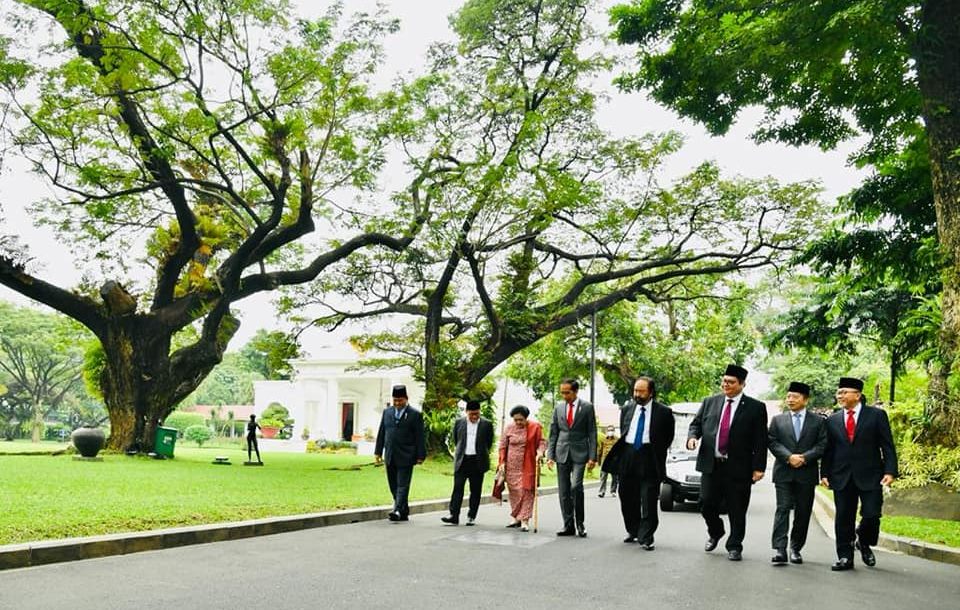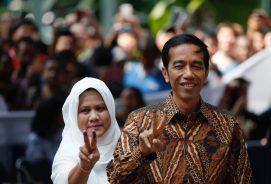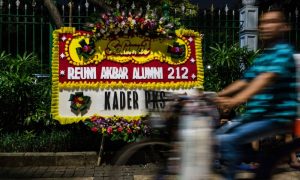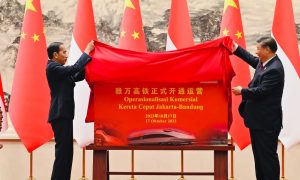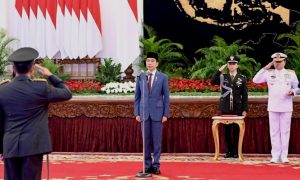Editor’s note: this article is based on the author’s Political Update paper presented at the 2023 ANU Indonesia Update Conference, the full version of which appears in the December 2023 edition of the Bulletin of Indonesian Economic Studies.
••••••••••
In 2023, as the second term of Joko Widodo (Jokowi) concludes and the 2024 election looms, elements of his ruling coalition have renewed strategies of accommodation, co-optation, legal challenge, repression, and coercion to restrict the prospects of open political contestation. Examined in totality, these tactics directly target the core institutional and political wins of Indonesia’s reformasi movement: regular elections, human rights, rule of law and judicial activism, regional autonomy and anti-corruption. The inability of oppositional and protest movements to resurrect and rebuild a national coalition to curtail the elite rollback of reformasi indicates that they are exhausted as a salient political force.
Surveying this narrowed field of political contestation in the twilight of the Jokowi administration, I am struck by the extent to which the previously untouchable institutions of reformasi have been subject to elite rollback. What contestation there is appears primarily generated by internal splits between this ruling coalition. This political narrowing, I argue here, is driven not only by Jokowi’s desire to see the 2024 presidential elections proceed on terms favourable to his own political interests, but also out of a broader political imperative to foreclose conflicts arising from the contradictions and inequalities inherent in Indonesia’s middle-income status.
Critically, while millions of Indonesians have been lifted out of poverty since the Asian Financial Crisis, that social mobility has not has not translated into economic security. While Indonesia’s middle and upper classes continue to benefit disproportionately from economic growth, over 40% of the Indonesian electorate are “precariously non-poor”. Continued social mobility for this “aspirational middle class” is contingent on the Indonesian government’s commitment to, and ability to deliver, core rights and quality services, in particular around labour, housing, health, and education.
But how do governing coalitions appease voters for benefits that are only likely to emerge in the medium term? More importantly, given the predatory interests that block reforms in key sectors, can successive governments ever develop the political coalitions to deliver quality services to Indonesia’s working poor? I argue that Indonesia’s democratic decline is a function of the new political imperatives of Indonesia’s middle-income status.
All the president’s men
On display in 2023 has been Jokowi’s power to (re)shape the terms on which the 2024 presidential elections are fought, due in part to his soaring personal popularity as his term comes to an end. Whereas former president Susilo Bambang Yudhoyono slunk out of office in 2014 on approval rates of 49%, Jokowi’s approval ratings are the highest since he entered office in 2014, hovering between 75–85% throughout 2023. The president’s vigilance on inflation rates and his expansion of social welfare programs in the lead up to the election have given rise to an unexpected economic bounce fuelled by consumer spending.
The effect of this popularity has been that Jokowi has been able to embed his personal and policy interests into the presidential race. Proposals to extend the presidential term beyond the “previously sacrosanct” two-term limit only dissipated once Jokowi turned his influence towards the presidential nomination process, using political nepotism to secure his interests.
The president has shored up his family dynasty by promoting the political careers of his sons, Gibran Rakabuming Raka and Kaesang Pangarep. Jokowi and his wife Iriana were instrumental in ensuring Gibran would claim the vice-presidential nomination on a Prabowo ticket. Jokowi has also helped manoeuvre his youngest son Kaesang, a YouTuber turned catering entrepreneur, to become the chair of the Indonesian Solidarity Party (PSI) in early October 2023. Over Jokowi’s second term, PSI shifted from being an overtly “millennial” party with secular progressive credentials to the guardian of the president’s legacy and of “Jokowisme”. Kaesang’s takeover of PSI finally gives Jokowi a party vehicle that is unencumbered by rival powerbrokers and can advance his interests in the political system, should it enter parliament in 2024.
Coercion by criminalisation
A second arena in which we have witnessed a narrowing field of democratic political contestation has been in the harnessing of Indonesia’s law enforcement agencies to pursue political figures—whether opposition, or nominal allies—on fresh and resurrected corruption charges.
An important instrument in this project has been the Corruption Eradication Commission (Komisi Pemberantasan Korupsi, or KPK). The KPK was established in 2002 as a fundamental demand of the reformasi movement, and over the period of Indonesia’s democratic reform it became a prized institution of legal activism. After numerous failed attempts, parliament suddenly passed crippling amendments to the KPK Law in September 2019 and installed Firli Bahuri, a police general aligned to intelligence tsar and PDI-P party stalwart Budi Gunawan, as its chairman.
The fruits of the KPK’s political co-optation were seen in the agency’s once-celebrated investigatory powers being harnessed to influence party coalition formation ahead of the 2024 presidential nomination.
The middle class president
Jokowi’s developmentalist democracy goes beyond a simplistic personal attribute or set of beliefs: it is inherent to his class status.
But a series of high-profile corruption scandals pursued by the KPK and the attorney general’s department irreversibly weakened the Anies Baswedan coalition. In September 2022, the KPK announced it had opened a corruption investigation into the then governor of Papua, Lukas Enembe, a major revenue raiser for Partai Demokrat. By June 2023, the KPK had also put the then agriculture minister Syahrul Yasin Limpo, a senior NasDem politician, under investigation, raiding his homes and the ministry. Two days before PKB party chairman Muhaimin Iskandar was announced as Anies’ running mate in September 2023, the KPK summoned Muhaimin to discuss a corruption case within the Ministry of Manpower, which Muhaimin had led during the SBY government from 2009 to 2014.
Firli also continually circulated rumours of corrupt conduct on Anies’ part relating to a Formula E electric vehicle grand prix organised under his governorship. The Formula E affair became a full-blown crisis in mid-2023 when Firli terminated Brigadier General Endar Priantoro’s secondment from the Indonesian National Police (Polri) to the KPK as its investigations director, after Endar allegedly refused to indict Anies, citing a lack of evidence. As the conflict escalated, Polri chief Listyo Sigit Prabowo, a key Jokowi ally, issued a directive returning Endar to his position at the KPK.
This early tussle between Polri and the KPK suggested conflicting strategies within the ruling coalition over the tactics of criminalisation. In recent weeks, tensions between the police and the KPK have boiled over again as Polri pursue Firli Bahuri on charges of blackmailing Syahrul Yasin Limpo, forcing Firli to temporarily step down as KPK head. The timing here is instructive: as Jokowi has consolidated his support behind the Prabowo ticket—instead of that of his nominal PDI-P party colleague, Ganjar Pranowo—Firli Bahuri’s criminalisation project has been brought to heel.
Though the outcomes of the 2024 elections are still uncertain, there is space for critical debate over how competitive Indonesia’s elections really are, given the level of intervention in the nomination process, let alone the election itself. With Jokowi’s support now consolidated behind a single candidate, all eyes will be on the extent to which the President’s considerable resources, authorities and financiers will be leveraged for the Prabowo–Gibran campaign. Ultimately, 2024 will be remembered as the election that took place in part on the narrow terms, and in line with the interests of, the outgoing president.
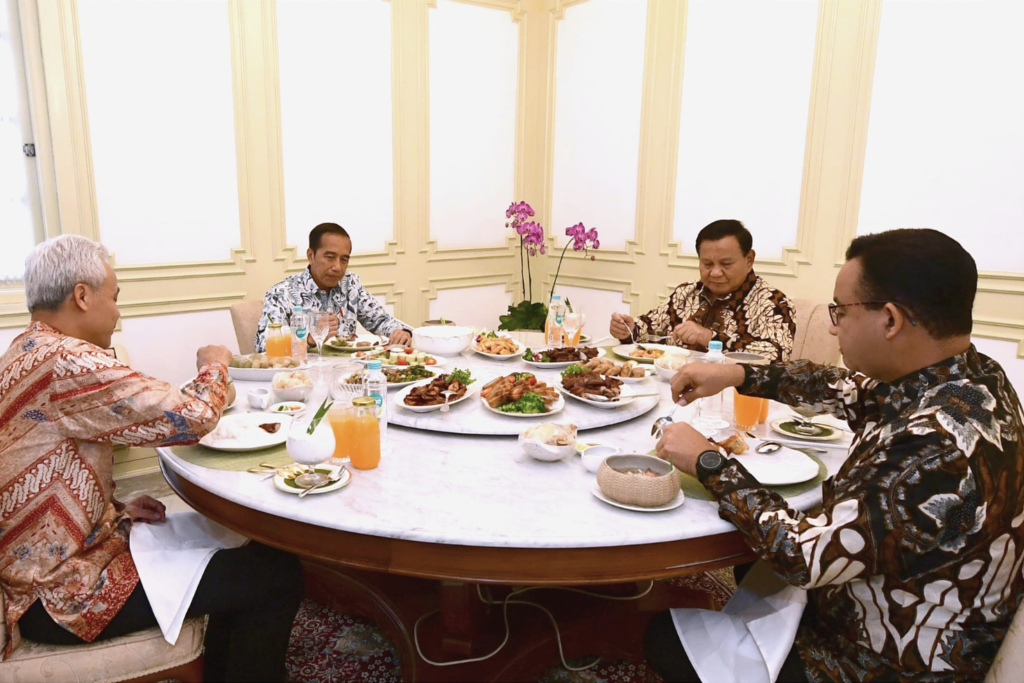
(L–R) Ganjar Pranowo, Joko Widodo, Prabowo Subianto and Anies Baswedan lunch at the presidential palace, October 2023. (Photo: Prabowo Subianto on Facebook)
Failure to launch: street-based social movements
Why have these efforts to narrow political contestation been so potent in their effects? Where are the sources of dissent and opposition that were once so characteristic of Indonesia’s democracy?
Writing in 2022, Ken Setiawan argued that Indonesia’s democracy still shows signs of “democratic resilience”, as evidenced by the ability of women’s organisations to agitate effectively for the long-delayed Law on the Eradication of Sexual Violence. But the early years of Jokowi’s second term has also seen a string of attempts by civil society, particularly Indonesia’s student movement, to reject technocratic policy-based engagement, in favour of reigniting the kinds of street-based protests movements that characterised reformasi. The #ReformasiDikorupsi (#ReformCorrupted) protests triggered by a suite of regressive legislative moves were some of the largest Indonesia has seen in decades, with up to 50,000 students across 40 cities in 18 provinces.
But why did these protests fail to reassert the political power of reformist movements? Certainly, conflicts about tactics among the university-based Student Executives Bodies (Badan Eksekutif Mahasiswa, or BEM), which played a key role in coordinating the protests, weakened the movements. But the student protests were also confronted with extraordinary levels of repression. In the 2019 mobilisations, 719 were injured and five high-school aged protesters were killed. Protests against the Omnibus Law on Job Creation in 2022 saw nearly 7,000 student protestors arrested. Intelligence counter-operations gave credibility to government accusations that the students had been infiltrated by violent terrorists and anarchists, muddying the moral waters for the students’ cause. Finally, pressured with sanctions by the education ministry, university leadership threatened to expel students who took part in anti-government protests.
Oppositional movements have been further handicapped by the Jokowi administration’s effective disorganisation of the activists and prominent professionals capable of mobilising public opinion. As the distain of the #ReformasiDikorupsi campaigners made clear, many former 1998 activists, such as Teten Masduki and Budi Arie Setiadi, have abandoned the movement for well-positioned careers in or supporting the Jokowi administration. There, they have been an important presidential mouthpiece to Indonesia’s progressive social forces, translating Jokowi’s political intent and disarming civil society in its efforts to counter the government’s agenda.
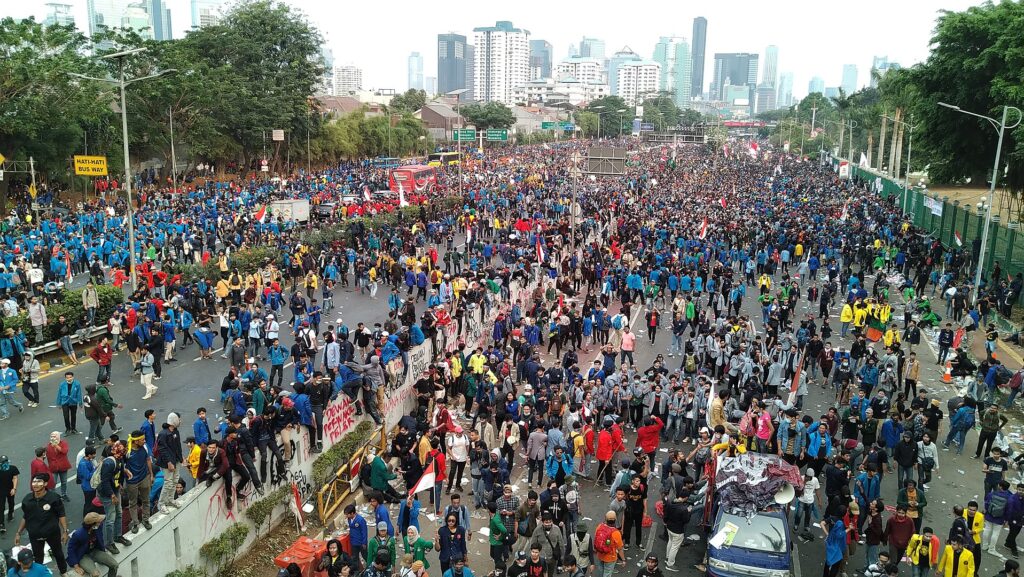
A scene at Gatot Subroto street during the September 2019 Jakarta protests against revisions to the KPK Law (Photo: Jahlilma, Wikimedia, CC4.0)
Kanjuruhan as an emblem of weakened civil society
These factors help to explain the inability of oppositional and protest movements to respond on a national scale even when massive and potentially triggering events occur. One such event was the Kanjuruhan Stadium tragedy. In October 2022, 135 men, women and children died when a joint command of Malang police and national police (Polri) tactical officers (Korps Brigadir Mobil, or Brimob) shot tear gas into an overcrowded stadium of families and supporters, generating international media scrutiny. It was the second-deadliest stadium disaster in football history.
Tens of thousands of protesters took to East Java’s streets in the weeks and months after the livestreamed tragedy, calling for justice and police accountability. As Indonesia reeled in shock, protesters across the country gathered in tearful solidarity for the victims. Photos of banners calling for justice in international football stadiums in Munich and Dortmund immediately went viral. In Malang, demonstrators expected that the intense pressure would culminate in nationwide demonstrations that “would tear up the pavement in protest for Kanjuruhan”, as one journalist on the ground related to me.
Jokowi’s inner circle quickly recognised that if left unmanaged, the Kanjuruhan incident could bring forth another violent spell of anti-government protests. The president’s trusted inner circle ran a concerted campaign to control the fallout. Stifling calls for the police chief to stand down, Jokowi toured the stadium, shifting the blame to the country’s ageing sports infrastructure. Erik Thohir, minister for state-owned enterprises and Jokowi’s favoured candidate for head of the Football Association of Indonesia (PSSI), flew to Geneva to orchestrate a visit by FIFA president Gianni Infantino to Jakarta. The national police chief, Listyo, immediately transferred the Malang and East Java chiefs to Jakarta, blaming football hooliganism for the police response.
Commissioners on Indonesia’s National Police Commission (Kompolnas), once imagined as Indonesia’s police oversight body, leapt to the force’s defence, contesting every detail of the event put forward by civil society. Meanwhile, witnesses and victims’ families were subject to harassment by local police and intelligence officers. When digital media platform New Naratif released a viral video forensically dissecting the actions of the officers on the pitch, journalists found their WhatsApp online messaging accounts hacked.
Driving the protestors’ optimism was that the Kanjuruhan massacre had occurred in a dangerous moment of unprecedented public scandal for the Indonesian police. August 2022 had seen Inspector General Ferdy Sambo, a two-star general heading up Polri’s internal affairs bureau (Propam), arrested for ordering the execution of his adjutant Brigadier Nofriansyah Yosua Hutabarat, by fellow aide Richard Elizer Pudihang Lumiu, after Yosua was alleged to have been sexually involved with Sambo’s wife, Putri Candrawathi.
As the Sambo drama unfolded, a series of social media leaks and rumours emerged linking the general to everything from a secret unofficial hit squad to a major online gambling consortium . A number of human rights organisations such as Amnesty International reasserted demands for root and branch police reform. But for the clutch of NGOs working closely with Polri to aid the police’s technical implementation of the Law on the Eradication Against Sexual Violence—2022’s major progressive victory—speaking out on Kanjuruhan was incredibly challenging.
Concurrently, digital media reporters observed how, as the Sambo trial ramped up, traffic on the Kanjuruhan articles shrunk. Journalists’ attempts to reignite public interest in the disaster dwindled as the Sambo trial increasingly transfixed the nation. Meanwhile, the early allegations implicating Sambo in wider structures of institutional violence and corruption never re-emerged in the public eye. Instead, the trial assumed a soap opera storyline in which Sambo was presented as the quintessential “bad apple”, and his wife the scheming victim. Yosua was the upstanding officer, son and husband, and Richard the penitent accused begging for public redemption.
The climax of the trial came when the court handed down a stunning sentence of death to Sambo for the premeditated murder of Yosua. The courtroom drama had a direct and depleting effect on calls for accountability in Kanjuruhan. The anticipated public protests in solidarity with Kanjuruhan never materialised and the public demands for justice for Malang simply ebbed away. This meant that while Sambo was publicly excoriated (and less than six months later, his death sentence commuted to life imprisonment) the structural impunity that led to the Kanjuruhan tragedy was effectively preserved.
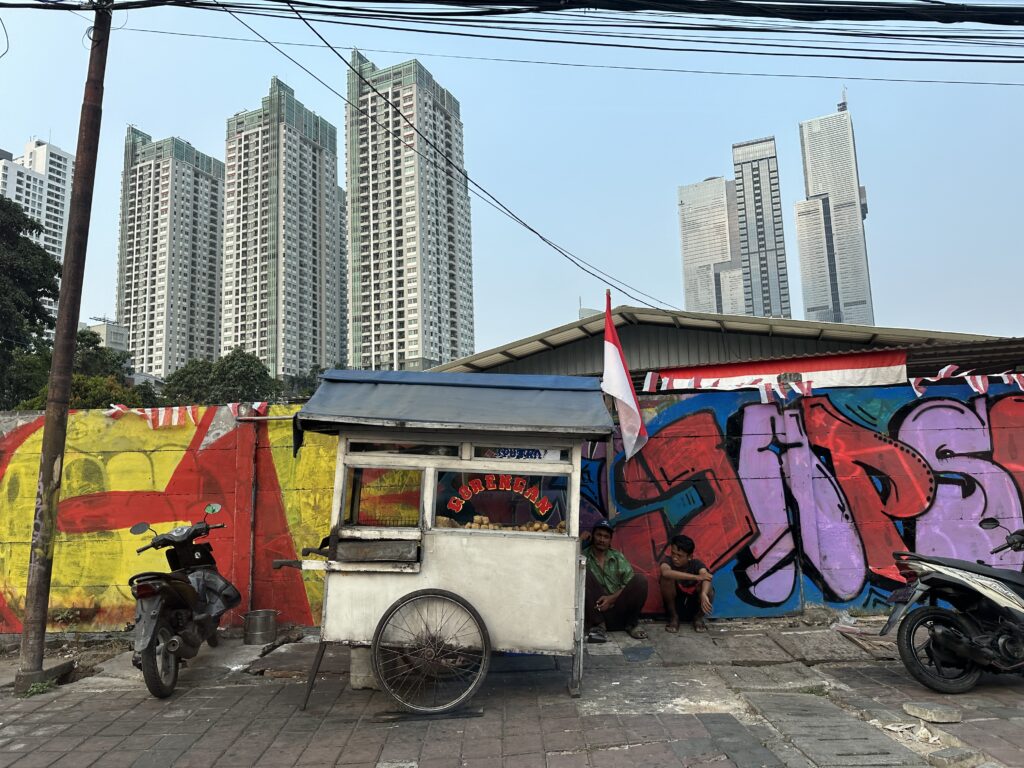
A scene in central Jakarta, September 2023. (Photo: New Mandala)
The political economy of the middle-income trap
For many familiar with Indonesian politics, the idea that Indonesia’s democracy is experiencing a marked decline is not new. After all, the social groups aligned with reformasi have long been marginalised, and scholars have charted diverse drivers for Indonesia’s democratic decline: the weaponisation of state institutions to assail opponents; the rise of a polarising Islamic populism and the government’s heavy-handed efforts to weaken it; a fragmented civil society beset by divisions on issues of religious ideology; the longstanding weakness of the organised left; and the Indonesian public’s own ambivalence about liberal democratic norms amid deep-rooted and growing social inequality.
But the debate about the drivers of Indonesia’s contemporary democratic regression has neglected the underlying structural drivers of democratic decline. I argue that the narrowing of political contestation in the Jokowi era is the ruling coalition’s response to a political problem inherent to Indonesia’s much-vaunted middle-income status.
We are often reminded that since the fall of authoritarianism and the 1997–98 Asian financial crisis, tens of millions of people have been moved out of poverty. But what have the poor moved into? The past 20 years have seen the dramatic expansion of what Hall Hill has called Indonesia’s “precariously non-poor”, an economic group who are no longer poor but who also have not yet prospered.
The World Bank alternatively refers to this socio-economic stratum as Indonesia’s “aspiring middle class”—a term that is something of a misnomer. For this group, the economic security of middle-class status is still out of reach, raising doubt over the extent to which it is truly “aspirational”. The Bank argues that this group’s continued social mobility depends on the government’s ability to deliver better services (and arguably, although this goes unmentioned by the Bank, better labour conditions).
These are immense tasks for any administration, let alone one experiencing Indonesia’s current political and economic challenges. At 44% of the Indonesian population, this “precariously non-poor” are arguably Indonesia’s largest voting cohort yet, their “vast and disparate” features mean they are unable to appreciate their common political interests. The aspirational but vulnerable nature of Indonesia’s working poor is front of mind for President Jokowi, who has made improving government services—including public transport infrastructure, the expansion of social welfare, access to health and higher-quality education—the signature policies of his administration.
But upgrading reforms such as these require an institutional sophistication and temporal horizon that are far more difficult in complexity than the previous transition from low to middle income status. More importantly, as the political scientists Richard F. Doner and Ben Ross Schneider argue, the middle-income trap lies in the necessity for “extraordinary collective action and coalition building” across deep social cleavages and inequalities for “benefits that will only emerge in the medium or long term”.
In Indonesia, there are immense barriers to establishing the political pacts required to forge such reforms. The Indonesian state has been moulded to protect oligarchic interests, and faces a challenge in shifting these interests in service of “better government services”, as the World Bank puts it. Consider education, a sector critical to the socio-economic mobility of the precariously non-poor. Research by Andrew Rosser, Phil King and Danang Widoyoko has examined the prospect of quality reforms in Indonesia’s education bureaucracy, concluding that despite urgent shifts in policy to upgrade education quality, the inability of the political elites to challenge vested interests means that contestation “has been settled in favour of predatory elites”.
Such is the fragmentation of the “aspiring middle class” that poor government services and the lagging pace of reform only becomes problem for rule when parts of this “dangerous class” become political mobilised. This occurred during Prabowo’s 2014 and 2019 presidential campaigns, as Jokowi’s challenger spoke darkly of corrupt elites stealing away the economic opportunities of the Indonesian people.
This is not to suggest that Prabowo’s ultra-nationalist populism offered elements of the precariously non-poor an alternative vehicle for their interests, but that he effectively “politicised” their inequality within a framework of ultra-nationalist populism.
The political consequences of inequality were not lost on Jokowi or his political coalition. In an interview in his first six months of office, Jokowi admitted that at 0.43, Indonesia’s Gini coefficient for income inequality—the fastest rising in the region—was “for me…dangerous”.
This predicament is deeply implicated in the administration’s second-term political strategy. While Jokowi tried to deal with inequality by promoting various social welfare measures and pursuing economic growth, he also tackled the political problem: namely, the political candidacies and movements that sought to mobilise inequality as an issue. As such, critical to the maintenance of Jokowi’s rule was the 2019 co-optation of Prabowo into Jokowi’s government and a concerted legal and social purge of so-called “Islamist” forces, dismantling the mobilisational structures of the opposition. These strategies have left Indonesia without a coherent opposition, consolidating the ruling coalition and giving it free rein to reverse the key victories of reformasi.
Thus, what has broadly been understood in the literature as “democratic decline” can best be interpreted as a set of political dynamics set in motion by the underlying necessity to politically manage the aspirations of the precariously non-poor, and keep them harnessed to the government’s model of national development. Whatever regime takes power in the future, managing the aspirations of Indonesia’s new precarious non-poor will be a fundamental project of rule for many years to come.
 Facebook
Facebook  Twitter
Twitter  Soundcloud
Soundcloud  Youtube
Youtube  Rss
Rss 